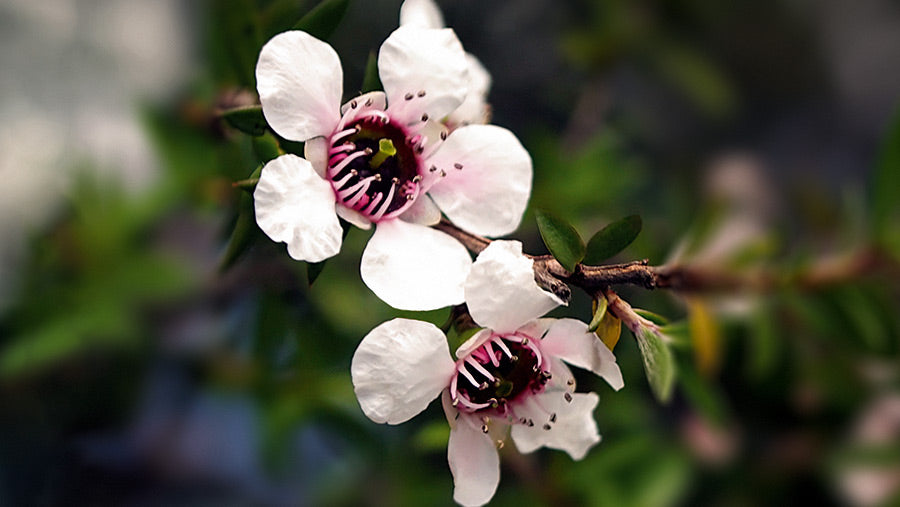A Maori New Zealand proverb says: "He iti, he iti manuka" - "Don't make fun of a little man - he can be as strong as Manuka"!
History of Manuka Oil
The western world first became aware of manuka oil through the discoverer Captain Cook from England. The Maoris soothed and healed the seafarers' ailments such as lacerated wounds, bleeding gums, gastrointestinal ailments and aggression with poultices and teas made from manuka leaves. Hence the term “tea tree oil”. Manuka oil was later forgotten. It wasn't until 1925 that the Manuka tree attracted attention again. Australian chemist Dr. R. Penfold discovered that manuka oil was more than ten times more effective against bacteria than the carbolic acid that was still used at the time. Since then, a bottle of tea tree oil has been part of the basic equipment of the troops in Australia.
The special tea tree oil: manuka oil
Manuka oil clearly stands out from all other tea tree oils. It contains far more different active ingredients in higher concentrations. Manuka oil is considered the "real" tea tree oil because it outperforms all other tea tree oils in all medical and cosmetic areas of application. Manuka oil is very stable (it does not oxidize as quickly under UV radiation), comes from wild growth and can be stored better than Australian tea tree oil.
The smell of manuka oil
Smells have a very distinct meaning in the animal and plant world. The manuka tree protects itself from fungi, parasites, germs and bacteria with its distinctive smell.
"Manuka oil is up to 40 times more effective against some microorganisms than Australian tea tree oil."
The effect of the smell of manuka oil on the human organism
Aromatherapy is based on the fact that scents can have a holistic effect on body and soul and thus alleviate some ailments. The molecules of manuka oil are very small and therefore reach the bloodstream and brain very quickly after application or inhalation, where they influence our emotional state through certain stimuli. Oils act like hormones as messenger substances and therefore influence the control of our organs. They have inhibitory, calming or stimulating properties. Overall, laboratory tests have shown that manuka oil is up to 40 times more effective than Australian tea tree oil against some microorganisms.
The benefits of manuka oil
- Manuka oil also penetrates into the deeper layers of the skin and thus attacks the evil at the root
- Even after prolonged use, pathogens do not become resistant to the oil
The active ingredients of Manuka
The composition of the active ingredients in tea tree oil determines their content and effectiveness. The ingredients of Australian tea tree and New Zealand Manuka differ in essential points. This also makes it clear why manuka oil is better tolerated and has a more intensive effect.
The main active ingredients are:
- Sesquiterpenes (2/3 in manuka oil): they have a controlling effect on the released histamines in the body, which are responsible for itching and inflammatory reactions, especially in connection with allergies. In addition, sesquiterpenes accelerate the healing of wounds and regenerate the skin and mucous membranes. Applied externally, they soothe irritated skin.
- Triketones (1/4 contained): these substances have so far only been found in Manuka and have an extraordinary effect on infections and fungal diseases. They rebuild skin and mucous membranes, promote wound healing and stimulate the central nervous system and brain activity and thus the ability to concentrate.
- Sesquiterpenols (concentration of approx. 5%): have a regulating effect on the excitatory and depressant transmitter substances, have a positive effect on the pituitary gland and thus ensure a stable hormone balance, which in turn is a prerequisite for an intact immune system.
"Manuka is much better tolerated than other tea tree oils."
- Monoterpenes (approx. 3%): stimulate the body to produce anti-inflammatory substances.
- Cineole: Found in almost all essential oils and can cause skin irritation if overdosed. Manuka contains only a very small amount of cineole (only 0.17%), while other tea tree oils contain over 2 to 7%. Therefore, Manuka is also much better tolerated than other tea tree oils.
My eight application tips
-
Catches? I put about 3 drops of manuka oil in hot (not boiling) water in a bowl, cover my head with a towel and inhale the hot steam deeply (caution: do not do this if you have couperose). Of course, you can also use an inhaler.
A full bath with approx. 8 to 10 drops of manuka oil and some cream or honey (serves as an emulsifier so that the oil is better distributed in the water) relaxes the muscles and the warm water exudes the active ingredients of the essential oil
- Sweaty feet: I massage the mild manuka oil into my feet; A massage with mild manuka oil is also beneficial for feet that tend to develop blue veins;
- athlete's foot? I put a drop directly on the affected nail or area. A footbath with about 5 drops of manuka oil is also great for letting the whole foot benefit from the oil's effects. By the way: you can soak the socks in warm water with manuka oil, then wash them; and it may also make sense to clean the shoes from the inside
- concentration problems? air purification? I put about 2 to 4 drops of manuka oil in my aroma lamp
- Disinfection? We presented a recipe for disinfection on Instagram: 100 ml of vodka, e.g. B. for acne-promoting bacteria (the pure application is not recommended for allergy sufferers and babies)
- Massage of corns, calluses (makes the affected areas soft and supple) and warts (removes them)
- minor burns? I first cool the affected area with cold water for a long time, then I put manuka honey or diluted manuka oil on the area and cover it with a plaster or bandage
- Sunburn? Applying the mild manuka oil to the damaged areas relieves pain and itching; alternatively use manuka gel – it also cools very well




Leave a comment